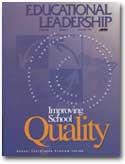On Wednesday afternoons in the Netherlands, elementary students are released early so teachers can plan instruction, develop curriculum, or participate in inservice training. Resource centers at 64 regional agencies provide instructional materials, books, and periodicals for teachers' use. The centers also are a place where educators from different schools can meet or sometimes attend workshops (Association of Educational Advisory Centers 1990).
The 64 Regional Education Service Agencies are just one example of how the centralized Dutch education system is structured to ensure responsiveness to local needs and interests (van Bruggen 1986). The Netherlands is one of few countries with a comprehensive national system for providing schools and teachers with professional support, the importance of which was recently documented in an ASCD-sponsored study (Pajak 1989). Although social, cultural, and political differences must be taken into account, the Dutch system offers many useful ideas to those in the United States who are serious about making state education departments and regional service agencies more responsive to schools.
Overview of the Dutch System
Figure 1 illustrates the Dutch system of support for educators. Although the national government determines education policy and provides most of the funding for education, Dutch parents can choose whether their children will attend nondenominational, Roman Catholic, or Protestant schools (Louis and van Velzen 1991). All secondary schools in the Netherlands are required to teach mathematics, Dutch, and English, but they offer other subjects as well, partly because students take national examinations at the end of their secondary studies. The courses and examinations that students take determine their areas of academic study and the institutions of higher education they can attend (Kouwenaar and Stannard 1989).
Figure 1. The Support Structure for Schools in the Netherlands
At the top of the Dutch support system is the National Ministry of Education and Science, primarily responsible for enacting legislation, implementing policy, and distributing funds to various education agencies. The ministry might be appropriately compared to a state education department in the United States.
Directly under the ministry are six agencies that provide support and technical assistance to schools. Three of these agencies are the National Institute for Curriculum Development (SLO), the National Institute for Educational Research (SVO), and the National Institute for Educational Measurement (CITO). The ministry also funds three National Pedagogical Institutes that coordinate nondenominational, Roman Catholic, and Protestant schools. Last, the 64 regional agencies support local schools and work on projects initiated by the 6 National Institutes (Ministry of Education and Science 1988).
Together, these organizations provide both general and specialized services to schools. General services are aimed at improving the functioning of the school as a whole; they strive to increase the school's capacity to solve problems as teachers collectively pursue their objectives. Specialized services provide assistance with educational research, assessment, and curriculum development (Hooghoff 1989). Although the entire system of professional support in the Netherlands is fascinating and worth studying closely, the two agencies that are most directly involved with curriculum and supervision are the National Institute for Curriculum Development (SLO) and the regional education service agencies.
National Institute for Curriculum Development
The National Institute for Curriculum Development (SLO) was founded in 1975 to work with teachers and colleges of education in developing new curriculums and instructional materials. Government-funded institutes that had addressed separate subjects were combined into this single agency.
A 25-member Board of Governors determines policy for the Institute. Twenty-four of the board members represent professional associations and organizations composed of teachers, parents, school board members, and other groups. One board member functions only as an observer. The board elects an executive committee of five members (National Institute for Curriculum Development in the Netherlands 1987).
This institute is located in the eastern part of the Netherlands, in the city of Enschede. Curriculum and instructional materials are developed there for primary, secondary, adult, and vocational education. The institute employs approximately 280 people, including a number of classroom teachers who work for the institute only one or two days a week (sometimes at home) and teach the rest of the time. Besides developing curriculum and related materials, these teachers also test products in schools piloting new resources.
Although curriculum objectives are determined at the national level, schools in the Netherlands have considerable autonomy in selecting the curriculum models they follow. The National Institute makes these alternative curriculums available. Curriculums are linked to objectives on national examinations, and schools may choose from a variety of packages or develop their own.
Requests for new curriculums and materials come to the National Institute from several sources including the Ministry of Education and Science, various professional associations, and the 64 regional agencies. Teachers can initiate curriculum projects through their professional associations or their regional agency.
The institute publishes almost 300 titles a year, including books, teaching kits, curriculum and instructional materials, computer software, and audiovisual materials, as well as analyses of materials and textbooks that are published by private companies. The analyses are intended to help teachers select materials and books that are best suited for their students. The institute also consults with private publishing companies, for a fee, to help them adjust the content of their books to the national curriculum. Sometimes publishing companies purchase the copyright to institute materials and publish them for sale.
The institute has recently been involved with several major projects, including identification of nationwide attainment targets and development of appropriate curriculums to guarantee a basic education for all students. Other projects address third world countries, consumer education, health, environmental issues, multicultural education, and European education (Hooghoff 1988, 1989, 1990). The unification of Europe in 1993 poses a special challenge for the institute to develop materials that reflect a European perspective, with the wide national, regional, and cultural diversity such a perspective implies.
Regional Education Service Agencies
The regional agencies are located within 64 separate geographical regions. They were established about 20 years ago to provide psychological services and expertise in testing. Within the last 15 years, though, their responsibilities have evolved to include curriculum implementation, inservice training, and collaboration on projects initiated by the various national institutes (Ministry of Education and Science 1988). Each agency is staffed with experienced educators, psychologists, and social workers as well as specialists in management, communication, information science, and media.
The agencies serve all the schools within their respective regions, including those with religious affiliations. Every school has regular contact with at least one or two advisors, who offer a broad range of advice. Sometimes advice and guidance are provided to teachers and parents of children with learning or behavior problems. Individual plans are drawn up for students with special needs and are checked frequently for student progress (Association of Educational Advisory Centers 1990).
Schools often seek assistance from the regional agencies in developing curriculum and improving instruction in various content areas. Assistance is also available in the areas of information technology, gifted and special education, and multicultural education. Although Americans tend to think of the Netherlands as having a homogeneous population, the demographic composition is increasingly multicultural, multiethnic, and multilingual due to an influx of immigrants from Asia, Africa, and southern Europe since World War II (Hooghoff 1989). In the larger cities, 80 percent of the students in some schools are of Turkish or Moroccan descent, a result of the freedom that parents have to choose the schools that their children attend. The regional service agencies make a special effort to work with schools where multiple cultures are represented.
With the help of a regional agency, the city of Amsterdam recently piloted an experimental program in five schools to address the special needs of diverse student bodies. The program is similar to the concept of lead teacher in the United States. An outstanding teacher, called an “internal coach,” is released from classroom duties to work with other teachers in the school. The regional service agency provides training for the coaches and also designs a support program tailored to each school. Most of the coaches are involved with the reading program, and they coordinate testing and introduce multilingual materials, books on audiocassettes, and strategies for helping children who are immigrants or who come from socially disadvantaged backgrounds.
Responsiveness to Schools
The education support structure in the Netherlands is intentionally designed to ensure responsiveness to the needs of schools and to avoid the emergence of a self-serving bureaucracy. Each of the six national institutes, for example, is located in a different city, which diminishes the ability of the organizations to centralize their functions and influence (van Bruggen 1986).
Funding for the national institutes is also set up to encourage responsiveness to schools' needs. The Institute for Curriculum Development, for example, receives approximately 28 million Dutch guilders, or 17 million U.S. dollars, from the Ministry of Education and Science. A minimum of 40 percent of funds is reserved for projects initiated by schools. If school demands exceed the 40 percent, money is taken from projects originated by the ministry. (Forty percent of funding is targeted for ministry curriculum projects, and 20 percent is allocated for running the institute.)
Funding for the regional service agencies is also allocated in a way to focus on schools. The Ministry of Education and Science allocates to each of the 64 agencies about 51 Dutch guilders (about $35) for every student in its region. The local municipal government matches this amount (see fig. 1). A full 60 percent of the money is allocated for school-initiated projects. But if school requests exceed those funds, money is reallocated from the amount reserved for government-initiated projects. (Thirty percent of their allocation is usually reserved for such projects; 10 percent is dedicated to running an agency.)
Yet another mechanism for ensuring responsiveness to schools is the way in which the national institutes and regional service agencies are evaluated. Their performance is assessed on the basis of how often schools make use of the services they offer. The success of the National Institute for Curriculum Development is assessed, for example, on how many schools voluntarily adopt the curriculum models it develops.
Each service agency is governed by a board with parents, educators, and representatives from local government. Schools located within a region contract for services with their designated service center every four years. Soon, a school that is dissatisfied with the services provided will be able to contract with another service agency in an adjacent region. The national government is currently considering providing funds for support services directly to schools, which would allow schools to purchase supervisory support from private service agencies or colleges of education. The effectiveness of the entire Netherlands' Education Support Structure Act will be evaluated in 1995 to determine whether it should be continued.
Students and practitioners of supervision and curriculum can easily forget that alternatives exist to the education structures that are most common in the United States. Imagining the possibility of doing things differently can be difficult when working daily within the familiar context of local policies and state regulations. The fact that feasible alternatives exist becomes clearer when we consider the education systems that have evolved in other countries. The system of professional support services in the Netherlands and the manner in which the system is encouraged to respond to the needs of schools is especially relevant as the restructuring of American public education continues.





